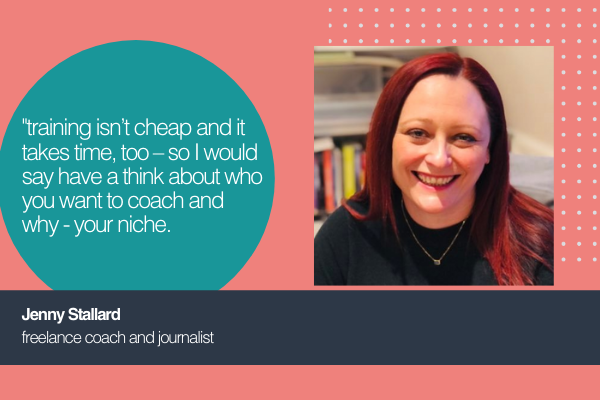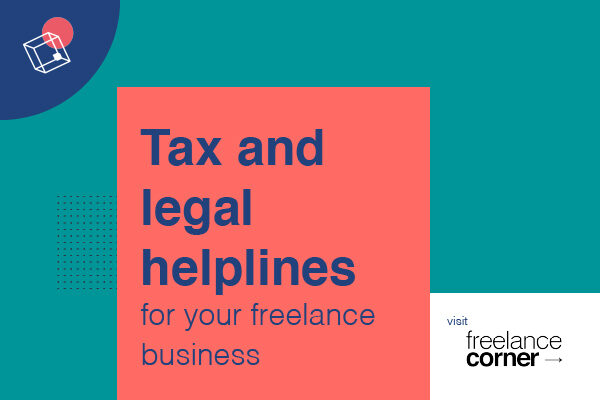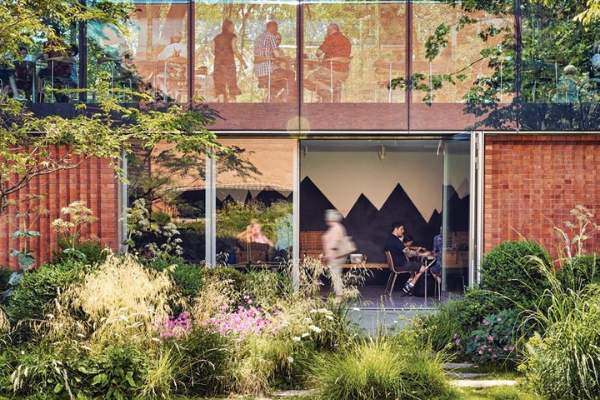My Freelance Story… is a series of short interviews with freelancers from a range of careers, explaining what freelance life is like for them.
This week, freelance coach Jenny Stallard answers questions about her career, the qualifications and training she would recommend, and the best thing about freelancing.
And if you’re inspired by her story and experiences, then why not take a look at our guide on how to become a freelance coach?
1. How long have you been freelance, and what made you become a freelancer?
I’m a self-confessed ‘threelancer’ – I have been self-employed three times. The third (and final!) time started in April 2017, after taking redundancy from a job at a national newspaper. The previous two times I left jobs on magazines to explore freelancing. Each time, I would often do so-called shifts, where I’d go into different magazine and newspaper offices for anything from a few days to a week or three months. But that meant I was often drawn back into a full-time role!
Then, with redundancy, came the decision that I would commit to freelancing for good – and now, nearly four years on, I find myself with a digital portfolio that I built after going freelance that third time, as well as a wellbeing platform, Freelance Feels, which offers coaching and workshops. I began training as a coach in October 2020, and ‘graduate’ in May 2021. This is an ICF (international coaching federation) accredited course and includes assessed coaching sessions as well as intense training in coaching methods and guidelines.
2. What does your freelance role entail?
I work on a mixture of writing jobs and coaching, and it’s a really enjoyable if demanding mix. I am a writer – which for me means I can work with words in many different ways for people. That could be writing an editorial piece, or sponsored content, or it might be writing blog posts for different clients. As founder of Freelance Feels and a coach, my role now involves writing about self-employed life, promoting the brand/business and connecting with new clients.
As I like to say ‘The Juggle is real!’. I was hoping for life to become more flexible when I moved, and, adding two puppies into the mix has meant that the day is very fluid. For example, I might go through emails, do some social media posts and then an hour coaching call (we do peer coaching with another course member for the training course). On a Thursday I am in ‘class’ for my coach training from 10-2.30, and I fit writing in around coaching and Freelance Feels. I might spend an afternoon interviewing and transcribing for a commission. For example, today, I’ve had a coaching session, worked on webinar content and begun planning season five of the podcast, as well as chasing up a potential new client who enquired about blog posts.
I work most days, but different hours – for example, a Friday afternoon might be quieter, and I would clock off around 4pm, but I’ll often end up editing a podcast episode over a weekend.
3. What qualifications did you need to become a freelance coach?
In short, none! That probably makes readers ask ‘so why train?’. Ruth Kudzi, who I am training with, says a lot about this on her podcast and social media. For me, training was important for two reasons. As a writer, I would often use a coach or expert who has some level of training as well as experience, to quote in an article. To me, it set them apart, not just in what they might know but also the commitment to that role. I want other people to see that in me, too. That I have committed to training means I am serious about being a coach and doing it ‘right’.
There’s a big difference between coaching and mentoring, and it could be someone who you feel is coaching you is actually mentoring – a coach will use certain guidelines set out by the ICF (International Coaching Federation).
As part of my training with Ruth I need to complete 50 hours of one on one coaching, which also then shows clients I have experience in that way. I have no ‘beef’ with anyone who is not formally trained! But for me, the second part of it was to learn something new – I wanted the challenge of going ‘back to school’.

4. Where do you find clients?
A lot is via social media, but also through word of mouth. Testimonials are key for finding clients, I think. I do Instagram posts and ‘live’ posts about coaching and what I can offer, as well as posting on Facebook groups and Linked In.
I am considering hosting a clubhouse room but a little tentative of the new platform right now.
5. What advice would you give to someone who wants to become a freelance coach?
I think the first and best step is to have some coaching yourself. That way you can see the process, learn about what you want from it and experience it before you go ahead.
Follow coaches on social media to see what they’re saying and what they offer – be inspired by them and comment. Ask questions and get to know the coaching ‘world’. Training isn’t cheap and it takes time, too – so I would say have a think about who you want to coach and why – your niche.
It could be that there is training which works specifically with the niche you’d like to go into. But most of all, be coached – that’s the best way to see if it’s something you’d like to do yourself and it’s one of the things that led me to want to be a coach.
6. What is the best thing about being freelance?
My immediate reaction was ‘lie-ins!’ but I know that’s not always the case (especially with those puppies!). The flexibility, I think – a word I’d pick over freedom. Being able to choose the hours you work, the things you do (even if that can mean less financial security) is wonderful, and I think what draws a lot of people to freelancing. Not having to ask ‘the boss’ if you need to go to the doctor or want to pop to the supermarket mid-morning, through to choosing when to log on and off.
I like being able to clock off on Friday and work a bit on Sunday, to be able to lie in bed and check social media knowing it’s part of my working day. To do Yoga at lunchtime and not worry if it takes more than the standard hour. With the flexibility comes a different kind of happiness, once you get used to not being tied to your desk.
Looking for more inspiration?
If you’re intrigued to learn more, why not read our guide on how to become a freelance coach? Or take a look at some of our other My Freelance Story interviews, including;
- My Freelance Story: Freelance Coach Jenny Stallard
- My Freelance Story: Virtual Assistant Louise Richman
- My Freelance Story: Photographer Jak Spedding
- My Freelance Story: SEO Consultant Steve Morgan
- My Freelance Story: Journalist Thomas Hobbs
- My Freelance Story: Content Creator Liz Randell
- My Freelance Story: WordPress Specialist Rhys Wynne
- My Freelance Story: Nail Technician Jade Conneely
- My Freelance Story: Writer and Marketer Dan Thornton
- My Freelance Story: Motorcycle Concept Visualiser Kar Lee
- My Freelance Story: Presentation Designer Illiya Vjestica
- My Freelance Story: Videographer and Editor Tom Rayner







